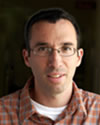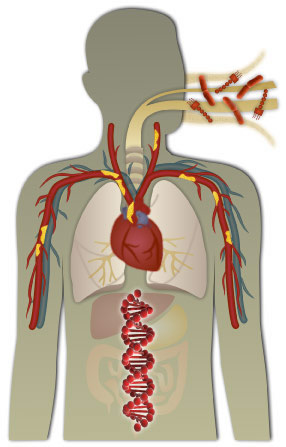Environmental Innate Immunity Group
Clinical Research
-

-
Michael B. Fessler, M.D. (http://www.niehs.nih.gov/research/atniehs/labs/lrb/host-def/index.cfm)
Principal Investigator -
Tel (919) 541-3701
Fax (919) 541-4133
fesslerm@niehs.nih.govCurriculum Vitae (102KB)

Research Summary
Host cells sense and respond to environmental pathogens through germ line-encoded pattern recognition receptors, the Toll like Receptors (TLRs). First appreciated for their role in antimicrobial host defense, it has since become clear that the TLRs and the innate immune response they initiate also play a pivotal role in several noninfectious diseases, such as asthma and atherosclerosis.
A number of recent reports suggest that innate immunity and host lipid metabolism are integrated. TLR4 responds to both microbial lipids (lipopolysaccharide [LPS]) and host lipids (fatty acids, ceramide, mmLDL), and is thought to initiate its cascade from cholesterol-enriched microdomains of the plasma membrane, lipid rafts. LPS signaling and rafts have both been shown to be regulated by ATP Binding Cassette transporter A1, a host cholesterol efflux transporter whose activity is sensitive to cellular cholesterol levels. Homology exists between LPS-binding protein and host lipid transport proteins, such as cholesterol ester transport protein, and it has been reported that LPS itself binds to and is regulated by SR-BI (the HDL receptor), and triggers a variety of perturbations in host lipid metabolism, intracellular and extracellular. Taken together, these observations and others derived from the Environmental Innate Immunity Group have led to the focus on two reciprocal areas of investigation: 1) the role of endogenous regulators of cholesterol/membrane trafficking in initiation and regulation of TLR signaling; and 2) the regulatory influence of innate immunity in host cholesterol metabolism.
In ongoing and future studies, the Environmental Innate Immunity Group—led by Michael Fessler, M.D.—will translate its hypotheses and experimental observations to human disease through studies in the NIEHS Clinical Research Unit.
Major areas of research:
- Role of cholesterol trafficking regulators in innate immunity
- Mechanisms of lung inflammation
Current projects:
- Investigating TLR signaling and cholesterol trafficking and their determination by select genetic polymorphisms in primary human leukocytes
- Investigating the role of innate immunity in models of inflammatory lung disease using human inhalation exposures
Michael B. Fessler, M.D., is head of the Environmental Innate Immunity Group in the Clinical Research Program and the Host Defense Group in the Laboratory of Respiratory Biology. He received an A.B. in philosophy from Princeton University in 1992, a medical degree from Harvard Medical School in 1996 and training in Internal Medicine at Massachusetts General Hospital from 1996-1999 and in Pulmonary/Critical Care Medicine at the University of Colorado from 1999-2002. Fessler developed an expertise in basic and translational approaches to the study of innate immunity, which he expanded during four years of a faculty position at the University of Colorado, before joining the NIEHS in 2006.

